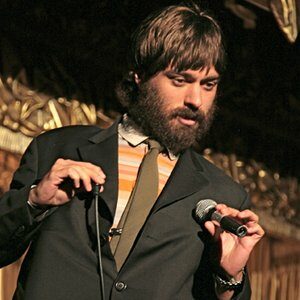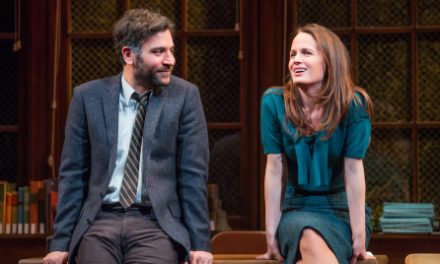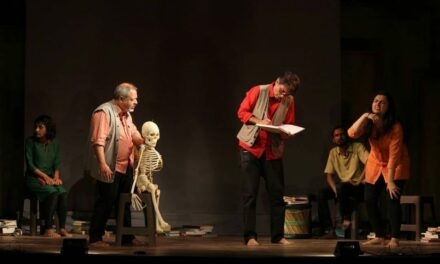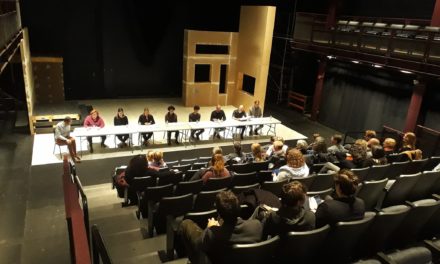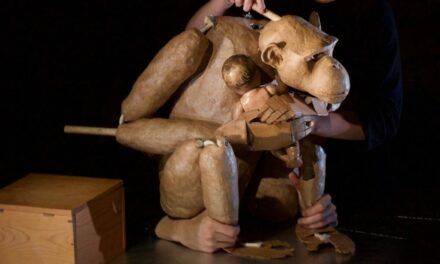Phil Burgers is an award-winning comedy writer and performer who has moved from clowning in France to producing critically-acclaimed shows at the Edinburgh Festival Fringe. Settling back home in Southern California to operate Silver Lake’s cozily hipster-chic Lyric Hyperion Theatre & Café, Burgers hopes to create a safe space for young performers to try, and fail, in a safe, productive, and most importantly constructive, environment that Phil once had to travel the world to find.
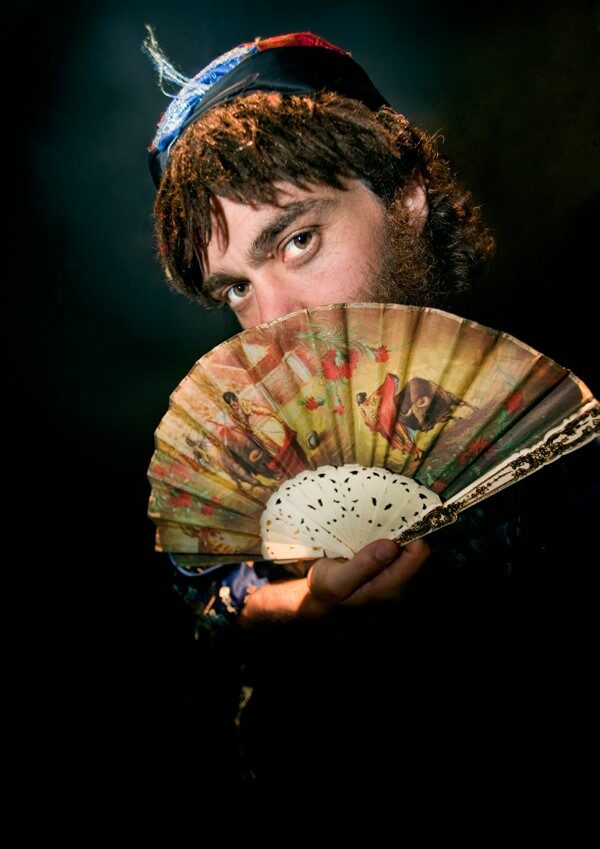
Image Source The Latest UK
Your short film The Passage explored race in Los Angeles in a way that was really contextual and earnest, and I was curious to what extent LA, and also coming from here and moving to Europe, and Australia, and spending all your time out there and coming back, has informed your worldview.
I personally am interested in people—all kinds of people, you know. Especially people from different walks of life. Having grown up in Los Angeles—and then my parents are both from Europe, so I would go there and be with my family in Italy and in Holland, and that, from an early age, made it really easy for me to bridge the gap between cultures. So from that, I developed an interest and a curiosity towards other cultures. And just an innate love of people, you know? Theater is all about people, it’s all about connecting to people, and it’s an opportunity to play with connection. You have different ways to connect, and one way to connect is through play.
And then just understanding, I think, through having traveled a lot. Everyone’s just a human being ultimately. Getting to that root and connecting to people is really fascinating, and I think that’s also really valuable as an actor or theatermaker. You’re not interested so much in the culture, the superficiality of the actor. You’re interested in their spirit, you know? That transcends culture. Getting to that root is interesting, it’s fun, it’s playful. In myself, too, it’s that element of myself that’s not specific to my culture—it’s more just specific to my personal humanity.
How did moving abroad shape your artistic voice in a way that Los Angeles couldn’t?
I tried to develop my artistic voice in Los Angeles at an early age, I was like twenty-four. But I found it too competitive in the world of art, and too industry-driven to be able to find my voice. There was too much pressure to sell, or to prove, or to show to the world how interesting I was. But I didn’t even know how interesting I was, you know, I was still… I don’t know. We’re all interesting, but we’re so insecure as well.
(Laughs) Yeah
From an early age, some people just have it and they’re like “Boom, this is who I am,” and they’re able to go out there and sell themselves because they’re so confident in their voice. But personally I didn’t develop my voice enough—it was just the wrong environment to discover. University is a safe place to try and to fail and experiment, where I didn’t feel that freedom in Los Angeles as an artist. I just never found my tribe, or my group, or a safe place to explore, because it felt too competitive or industry-driven.
Moving abroad took a lot of that pressure away, and was just more exciting as well, to be in foreign environments—and to be a foreigner too. I just never felt the pressure to get it right, it was just low stakes. And then the lower the stakes, the more free you feel to experiment, and to fail, ultimately.
Did you feel like the stakes were lower because—did you know you were going to move back to Los Angeles?
I kinda had it in the back of my head, I was like “if I ever came back, I would have to come back more established,” more confident in what my artistic voice was. And I have done that. I went away for ten years almost, and explored and played and practiced and experimented and discovered, and I’ve felt much more secure in the voice that I’ve found… Or not so much the voice, just a way to create that worked while I was away. I proved to myself that this way worked, and then I was like “oh okay, now I found a way, so I’m happy to come back.” But yeah, I always wanted to come back just because I’m from here.
And then specifically with the clowning training, you studied with Philippe—
—Gaulier, who is a student of Lecoq, and he teaches with that same kind of pedagogy.
Had you had any idea about clowning, or that that you wanted to try this, or anything like that? Or did you discover it in Europe?
I had seen a little bit. I was always interested in comedy. I was always interested in being funny, and the world of comedy and stupidity. But again, the comics here, it was just really improv-y, or something, and everyone was trying to get a TV show. And I was like, just—I don’t even know if I’m funny, or how to be funny in my way. So going to Philippe really helped me to discover how I was funny in only a way that I could be funny.
And then going and practicing it abroad just solidified it, or strengthened my comedic sensibilities, or my comedic voice. That was very particular to me, that I could just say “oh yeah, I can do this.” I probably had it in me, I just needed to go practice it and be guided to discover it. And that’s what Philippe did, he really helped me develop that kind of confidence.
And did you find that experimenting and playing that in different countries was particularly useful, or was it more the fact that you did it so much? …It could be both.
Yeah, I think that was just unintentional. I wasn’t thinking, “oh, I’m doing this show in Hong Kong, or Prague, or Australia.” And that’s what Philippe was so much about. We’re 27 people in his class, from 23 different countries. So we had South Africa, Japan, Columbia, Italy, Spain, Canada, everywhere. And we were just pissing ourselves at how funny the Spanish guy was, or the Japanese guy was, or the South African woman was. And again, it transcended culture. The spirit of that individual and the humanity particular to that individual is what was funny. And so he helped me access that, which I think was just naturally what’s accessible internationally. So it was just kind of a happy coincidence or accident that what he helped me discover was accessible across borders.
I imagine the physicality and the intense focus on the body has a lot to do with it?
No. It’s not the intense focus on the body, it’s the focus on the spirit. The spirit of the individual, it’s more in the eyes than it is in the body. Because that’s just like a puppetry thing, that’s a technical thing.
You could teach anyone to pick up this cup and drop it in a funny way, and it’s like okay, you could get anyone to do that. But why do you get me to do that, why do you get you to do that? Because you have this spirit about you that we connect to, not this technical skill. And maybe being in your body allows you to be more connected to yourself as well, and your spirit. That’s sharing your spirit more so than you’re sharing some physical, technical skill.
There were people in my class who had terrible technical physical skills. Terrible, like couldn’t do water or the elements. That’s one thing we do in neutral mask, we had like “do your interpretation of water,” and there were people who were so beautifully doing water. But this idiot who did water in his own way, which was so dumb, and so beautiful, and so stupid, no one else could do water like that! And it was terrible for water, you would never think “oh, that’s water.” But it was so beautiful and made us all laugh hysterically because of the spirit of that person, not so much because of their technical physical skill.
But again, as I said, being in the body gets you out of your head. And I think that’s what allows people to access your spirit because you’re not coming from a mental-thought place. Because lots of that is just a barrier to allowing us to see your spirit. A lot of your thoughts are just dumb, dumb constructs that are given to you by society and books—that are great, and interesting, and your intellect can absolutely help you. But you’re not led by your intellect. And this was a way to just be guided more by spirit and the intellect just kind of uplifted. So the intellect followed spirit, versus doing everything based on your intellect. That’s part of the clown experience. It’s not so clever and it’s not so driven by intellect. It’s driven by play and spirit.
Your colleague Chad Damiani said you’re “like a pure clown.” He said you say exactly what’s on your mind, and “if [you’re] upset, [you] wear it through [your] whole body.” And I’m curious if that’s something that was maybe sorta hidden away before you did the clowning, or if you’ve always felt sort of expressive and almost didn’t realize that in Los Angeles…?
Maybe, yes. But then in Los Angeles, I felt a pressure, again, to perform, or to prove, or to show. And that pressure, and being led by a need, got in the way of the purity. So it was good to go to Philippe and have him just tear away the things that were in the way of that purity—which was probably always there, but because I’m in this new place, new environment, where you have to kind of perform or show, then it gets in the way. So he helped me access that.
When you came back here you were doing this character Dr. Brown in standup comedy clubs, and you mentioned you did not like standup—
Did I say that? When did I say that? It’s not the first time that I heard that “I don’t like standup” from someone else…
I think it was—there was a podcast [The Comedian’s Comedian Podcast] in 2012. My question was, what was it about [standup] that you were thinking at the time, and has it changed since?
I’ve always—good standup is fucking amazing, you know? It’s the best! And great standups are great clowns too. And what makes them a clown is they’re just themselves, there’s an authenticity to them. So I’m not interested in inauthenticity, and I was finding a lot of inauthenticity in standup, because people were hiding behind their words and hiding behind concepts. Hiding behind their intellect, and hiding behind a little bit of persona.
In the work of the clown, you break the persona, because that’s again what’s covering up the spirit. And great standups, their spirit comes through their persona, and you can see it. But a lot of times, especially in amateur standup, people don’t really know what they’re doing, or just hiding behind a microphone, hiding behind this persona and hiding behind their ideas and their words. That does not allow you to be with them and to see them, really. That’s what’s not so interesting. And unfortunately you just find it a lot in the world of standup, but you also find many terrible clowns too, who are hiding behind some shitty clown persona.
You can still use the persona, as long as there’s spirit coming through. So it’s inauthenticity. And for some reason I found a lot of inauthenticity in the world of standup. That is not to say standup can’t be authentic, and when they are I think it’s fuckin’ genuis. I think any art that’s coming from authenticity is beautiful and valuable.
So, I’m trying to square this with the Dr. Brown persona. Could you elaborate a little bit more about how and why you make this distinction between Dr, Brown, and then yourself, Phil?
Because it’s fun to have a different stage name. It’s just fun to be like “okay when I go on stage I’m this idiot.” I’m not the same person I am on stage because I wouldn’t be able to survive. It’s just different, it’s a stage name. With a clown it’s just fun to have a name; it’s boring to have your own fuckin’ name. Where standups would just call themselves their name because it’s straightforward—and that’s okay! But with a clown, I think, it’s more fun to sort of play with that. So it’s more out of fun.
So when you go out on stage as Dr. Brown, you feel like there’s no barrier there between you and Phil?
No, it’s just me out there in full play mode. Full, reckless, play mode. And that’s why I was saying it’s difficult to survive. But you can do whatever you want on stage as long as you’re respectful of the audience, appropriate. But you can also be really inappropriate! But you can’t really do that at a café or a meeting or something.
You said you like to work—when you’ve got a project—in an improvisational way with as much preparation as possible. And I’m curious what kind of preparation you do. Is it research, is it more of an internal discovery process of the character or piece?
It’s not so much research. The research is unintentional. The research is life experience and things you see in your life. But when you’re on stage playing, it’s just you playing. When you’re being an idiot with your friends, you’re not like “oh yeah I read this article about this, and now I’m gonna do this because bluuhh,” you know? Maybe it comes in, but it’s absolutely unintentional or subconscious.
But it’s just fun and play. When a kid goes to a playground and plays, they don’t play based on research unless they just saw Star Wars and now they’re pretending to be Darth Vader. Then sure that’s research they did, but they didn’t purposely do research to go play in the playground, they play in the playground because they like to play.
It’s almost like research by accident. It’s research because it inspired them, not because they went out to find it.
Exactly! Yes. That’s a really good way to look at it too, which takes away from this contrivance. Sometimes too contrived, it’s so researched. It takes away from the purity when something has another intention behind it. When the intention is pure play and connection, that’s beautiful.
So this podcast. You were in the UK, and you’d just finished running a series of workshops that you found difficult—you thought some people weren’t getting it, you were wondering if maybe you weren’t articulating yourself well, or you weren’t creating the right atmosphere for everyone to succeed. In the seven years since, what have you learned about teaching this work, by teaching this work?
It’s still difficult. It’s difficult to strike the balance between honesty and lightness and playfulness. So much of the teaching that I do is about being critically honest about what I personally see, and being critical towards the individual, but still keeping a light and playful spirit while delivering that criticism, and doing so in a way that helps the person and doesn’t collapse the person, or restrict them too much.
It’s about breaking the persona down, not the person.
Yeah, exactly! And that’s always a danger. Because the work is so personal, you’re always criticizing the work, you’re not criticizing the person. But because it’s so close, that line can be very blurred. And some people are less receptive to it, and you might have accidentally gone to the other side of the line. That’s always something that is about a tightrope walk. And when you’re walking the tightrope, you sometimes fall.
Do you feel any particular pressure in that way, or have you gotten used to the cycle of some people not being receptive?
Pressure to help people in a way that’s not destructive?
Yeah.
I don’t feel “pressure.” And it’s very intuitive, too, the work. It goes back to the research thing; it’s not so manipulated. You’re not thinking so much about it while you’re doing it, it’s like, “How’s it going?” “Oh hey! I think your jeans are a bit tight!” You know, whatever.
…I don’t. They’re perfect.
Omigod thanks.
I don’t feel pressure, but maybe afterwards you’re like “maybe I should have done it like that,” but you’re kinda conscious of it in the back of your head. Like “Okay, I gotta be tactful about this.” And that tact is what I’m still learning. I don’t know in that time if I was really having trouble, but I have less and less trouble with it because I’ve learned from my mistakes. But I haven’t perfected it by any means.
These days you’re here running the Lyric Hyperion. There are drag brunches, there are piano recitals, there are plays, there are screenings. Are you involved with the production, really, or have you sort of built that team and use this space as a playground?
I think it’s more sorta that. I’ve built the team of who’s booking the shows, how the theater runs, who’s doing tech, who runs the café, just overseeing all that so that I have a space to come play at. But I don’t want to be personally so involved in the bookings. I do definitely want to continue to be a space, and encourage people to come fail here. I want to offer this as a space that is protected from the industry, which is something I had to leave Los Angeles to go find. I want people not to leave Los Angeles to get what I got by leaving. That’s the whole point of this.
This post was written by the author in their personal capacity.The opinions expressed in this article are the author’s own and do not reflect the view of The Theatre Times, their staff or collaborators.
This post was written by Colin McIsaac.
The views expressed here belong to the author and do not necessarily reflect our views and opinions.

